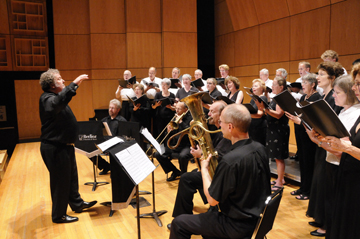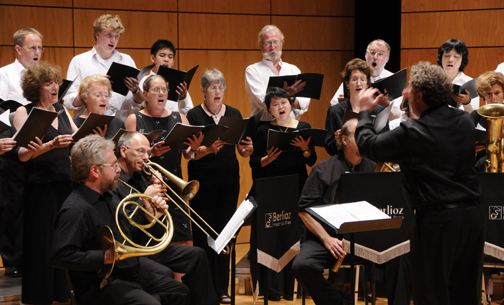
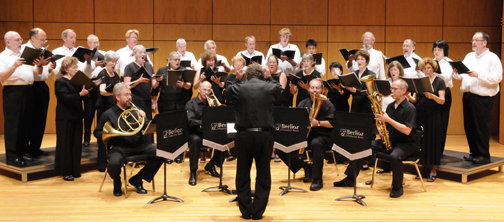
Mendelssohn's Seasons
by Clifford Bevan
(words by Henry Wadsworth Longfellow)premiered by The Anglican Singers of New London, CT with Wim Becu, guest conductor
1. An April Day, Allegro non troppo
2. Rain in Summer, Andante
3. Autumn, Maestoso
4. King Witlaf's Drinking-Horn, Allegro giocoso
"The most ineffective and most offensive way to offer a tribute to that extraordinary nineteenth-century German polymath Felix Mendelssohn-Bartholdy (1809-1847) would be to try to compose in his own very distinctive style. Thus, rather than attempting a work of musical pastiche, I have tried to allow myself to be influenced by his music in the way that several generations of British musicians were influenced, as recently as the early twentieth century.
Although Mendelssohn was a fluent English speaker and set many verses to music, these did not include any of these written by his contemporary, the American poet Henry Wadsworth Longfellow (1807-1882), though there is little doubt that each was aware of the existence of the other.
Mendelssohn paid many visits to Britain where he established a unique popularity with a large cross-section of the population. Prince Albert, Queen Victoria's German consort, greatly approved of his compatriot's wholesome attitude to music and the arts (Mendelssohn was also a gifted painter), resulting in regular music-making in the royal presence. At the same time, Mendelssohn forged strong links with the Philharmonic Society in London, and his oratorio Elijah was commissioned by, and first performed at, the Birmingham Music Festival of 1846. His slighter pieces, particularly those for pianoforte, were sold in vast numbers for the delectation of the emerging middle classes.
Mendelssohn did not take up an invitation to visit the United States, but his popularity there was second only to that in the United Kingdom. Elijah, for example, was first performed in the Broadway Tabernacle, New York on 8 November 1847 by the New York Sacred Music Society. The second performance was given on 9 November 1847 by the American Musical Institute in the same hall.
Longfellow's interest in Europe became evident with his student enthusiasm for the works of Sir Walter Scott. A remarkable linguist, his first journey across the Atlantic resulted from Bowdoin College's appointing him Professor of Modern Languages on graduation on the condition that he spend time in Europe. Later, he was appointed to a similar post at Harvard and made further visits to Europe, particularly England and Germany.
As a writer who treated Romantic subjects in an approachable style he achieved wide popularity throughout the English-speaking world. In this respect composer and author shared something in common. They also shared the inevitable reaction of later generations. Longfellow's fate was to be designated as a "hearthside rhymer," while as early as 1881 the journal Punch was reflecting progressives tastes of the time by referring disparagingly to Mendelssohn's music with its lack of "wrong notes."
The present work is an attempt to suggest what might have been. The instruments used were all included by Mendelssohn in various of his compositions for choir and orchestra, and throughout the work certain of his themes appear. These are particularly evident in the introductions to the first and fourth movements and the second half of the first movement. He benefited (or suffered) from strict musical training in his teens which, along with his great love for the music of Johann Sebastian Bach, attracted him to fugal forms. The third movement of Mendelssohn's Seasons acknowledges this.
Particularly in his orchestral works there is sometimes a vigour which can be easily overlooked, and the fourth movement reflects this aspect of his style. Throughout, there are also reminders of the debt that Mendelssohn, like other nineteenth-century German composers, owed to the folk music of his country.
The overriding practical aim has been to approach as far as possible Mendelssohn's unrivalled success in giving choirs the opportunity for a 'good sing'."
Clifford Bevan, Winchester, Hampshire United Kingdom
exploring the role of early 19th century brass
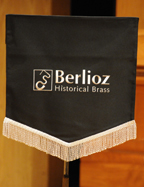
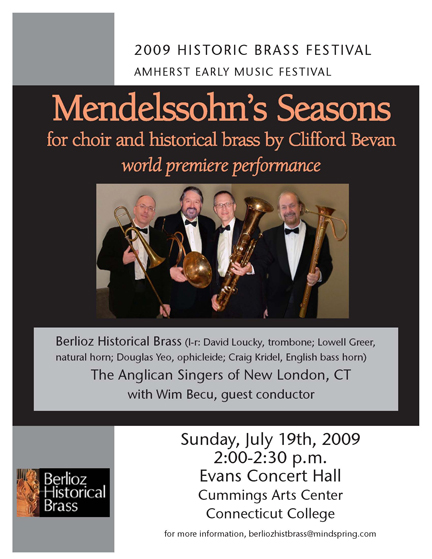
Piccolo Press : ITEA Historical Instrument Section : The Tigers Shout Band : Harmoniemusik : Links
